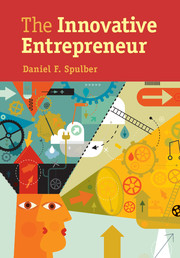Book contents
- Frontmatter
- Contents
- Preface
- Acknowledgments
- 1 Introduction
- 2 Entrepreneurial Motivation
- 3 Innovative Advantage
- 4 Competitive Pressures and Entrepreneurial Incentives to Innovate
- 5 Creative Destruction
- 6 Creative Destruction
- 7 Creative Destruction
- 8 Creative Destruction
- 9 The Wealth of Nations
- 10 Conclusion
- Bibliography
- Index
Preface
Published online by Cambridge University Press: 05 July 2014
- Frontmatter
- Contents
- Preface
- Acknowledgments
- 1 Introduction
- 2 Entrepreneurial Motivation
- 3 Innovative Advantage
- 4 Competitive Pressures and Entrepreneurial Incentives to Innovate
- 5 Creative Destruction
- 6 Creative Destruction
- 7 Creative Destruction
- 8 Creative Destruction
- 9 The Wealth of Nations
- 10 Conclusion
- Bibliography
- Index
Summary
Managers of existing firms already innovate – why is there any need for entrepreneurs to start new firms? The answer comes from the individuality of entrepreneurs, whether acting alone or as members of a team of founders. The economic contributions of the innovative entrepreneur result from individual initiative and creativity. Entrepreneurs can be innovative in ways that may be difficult or impossible for managers of existing institutions. This basic insight helps address the major questions in the economics of innovation and entrepreneurship.
The innovative entrepreneur is defined as someone who introduces commercial, scientific, and technological discoveries to the marketplace by embodying them in new firms. Innovative entrepreneurs not only provide new products and production processes but also create new transaction methods, business institutions, and industries that fundamentally change how the economy operates. Their impact on economic growth and development is extensive and evident.
The innovative entrepreneur differs from the replicative entrepreneur who establishes a firm by imitating or acquiring existing business models. Understanding the contributions of the innovative entrepreneur does not imply any criticism of the replicative entrepreneur. Both types of entrepreneurs establish firms that implement and diffuse inventions. Both types of entrepreneurs take risks, exercise judgment, and contribute time, effort, and personal funds. Both types of entrepreneurs provide useful products and services, invest in productive capacity, increase employment, and stimulate economic activity.
This book presents an economic theory of the innovative entrepreneur. The theory helps answer the major questions that continue to challenge researchers in economics, law, and management. The theory considers the motivation of individuals to become innovative entrepreneurs. The theory shows how individual initiative can give entrepreneurs an innovative advantage over incumbent firms. The theory examines how competitive pressures impact entrepreneurial incentives to innovate. The theory shows how market frictions affect the choice between entrepreneurship and technology transfer to existing firms.
- Type
- Chapter
- Information
- The Innovative Entrepreneur , pp. ix - xviPublisher: Cambridge University PressPrint publication year: 2014



